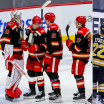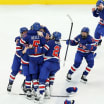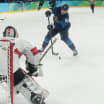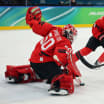"He was big," Payne said. "He looked like he was hard to beat and I think if you look at the number of missed chances, missed shots, it tells the story about the way the goaltender is playing. Not only do you not see a lot, he's forcing pucks to go wide, as are his teammates.
"When a goalie is on it, you usually see numbers start to add up in those missed-shot categories."
The defining moment for the Penguins was killing off a 5-on-3 in the third period.
"I thought that Pittsburgh's penalty kill was forced to win the game for them," Payne said. "They were outstanding. Nashville had very little opportunity to generate a play through to the net. You had guys in shot lanes the entire time. On the 5-on-3, a veteran guy comes out, wins a key faceoff and Ian Cole gets the puck down the ice.
"And 30 seconds peeled off the clock and they were able to weather that storm."
Payne addressed the Penguins' future and the toll of long playoff runs in back-to-back seasons. Pittsburgh became the first NHL team to repeat since the Detroit Red Wings in 1997 and '98.
"They're going to have competitors lining up for ways to beat them, and as hard as it is to keep your team in place, playing 100 games a year, takes something out of you," Payne said.
"There were a few times where that 100 games last year put them in some precarious situations, whether it was during the regular season or in the playoffs, early on. It's June 12 and they're just finishing up. They're not going to be in dial-it-in-and-focus mode anytime soon."


















